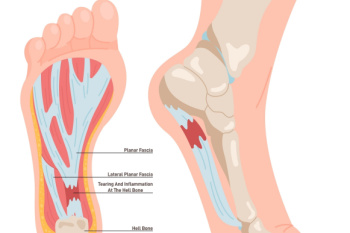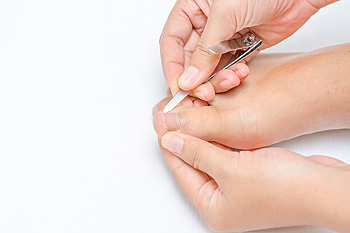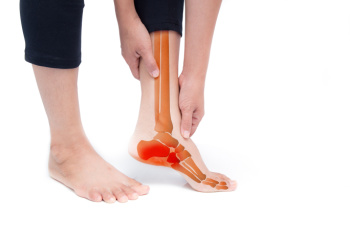Connect With Us
Blog

Plantar fasciitis is a well-known cause of heel pain, often felt as a sharp, stabbing sensation with the first steps in the morning or after periods of rest. The condition results from inflammation of the plantar fascia, a thick band of tissue that connects the heel to the toes. While it can be persistent, several strategies may help reduce discomfort and promote healing. Stretching exercises for the calf muscles and plantar fascia can improve flexibility and reduce strain. Wearing supportive shoes with good arch support and cushioned soles is essential for daily comfort. Custom orthotics can also help distribute pressure more evenly across the foot. Using anti-inflammatory medications may ease pain in the short term. However, if you are experiencing ongoing heel pain, it is suggested that you see a podiatrist for a proper diagnosis and appropriate treatment.
Plantar fasciitis can be very painful and inconvenient. If you are experiencing heel pain or symptoms of plantar fasciitis, contact Zina Cappiello, DPM from Dr. Zina B. Cappiello DPM, LLC. Our podiatrist can provide the care you need to keep you pain-free and on your feet.
What Is Plantar Fasciitis?
Plantar fasciitis is the inflammation of the thick band of tissue that runs along the bottom of your foot, known as the plantar fascia, and causes mild to severe heel pain.
What Causes Plantar Fasciitis?
- Excessive running
- Non-supportive shoes
- Overpronation
- Repeated stretching and tearing of the plantar fascia
How Can It Be Treated?
- Conservative measures – anti-inflammatories, ice packs, stretching exercises, physical therapy, orthotic devices
- Shockwave therapy – sound waves are sent to the affected area to facilitate healing and are usually used for chronic cases of plantar fasciitis
- Surgery – usually only used as a last resort when all else fails. The plantar fascia can be surgically detached from the heel
While very treatable, plantar fasciitis is definitely not something that should be ignored. Especially in severe cases, speaking to your doctor right away is highly recommended to avoid complications and severe heel pain. Your podiatrist can work with you to provide the appropriate treatment options tailored to your condition.
If you have any questions please feel free to contact our office located in Clifton, NJ . We offer the newest diagnostic and treatment technologies for all your foot and ankle needs.

An ingrown toenail might seem like a small problem, but it can cause big discomfort. When the edge of the nail grows into the surrounding skin, it can lead to redness, swelling, pain, and even infection. Wearing tight shoes, improper nail trimming, and injuries often make the problem worse. While home remedies may provide temporary relief, persistent or painful ingrown toenails need professional care. A podiatrist can safely remove the problem portion of the nail, easing your pain and helping to prevent future issues. In some cases, they may recommend a simple procedure to stop the nail from growing back improperly. If you have an ingrown toenail that will not heal or keeps coming back, it is suggested that you schedule an appointment with a podiatrist who can provide the expert care you need.
Ingrown toenails can become painful if they are not treated properly. For more information about ingrown toenails, contact Zina Cappiello, DPM of Dr. Zina B. Cappiello DPM, LLC. Our podiatrist can provide the care you need to keep you pain-free and on your feet.
Ingrown Toenails
Ingrown toenails occur when a toenail grows sideways into the bed of the nail, causing pain, swelling, and possibly infection.
Causes
- Bacterial infections
- Improper nail cutting such as cutting it too short or not straight across
- Trauma to the toe, such as stubbing, which causes the nail to grow back irregularly
- Ill-fitting shoes that bunch the toes too close together
- Genetic predisposition
Prevention
Because ingrown toenails are not something found outside of shoe-wearing cultures, going barefoot as often as possible will decrease the likeliness of developing ingrown toenails. Wearing proper fitting shoes and using proper cutting techniques will also help decrease your risk of developing ingrown toenails.
Treatment
Ingrown toenails are a very treatable foot condition. In minor cases, soaking the affected area in salt or antibacterial soaps will not only help with the ingrown nail itself, but also help prevent any infections from occurring. In more severe cases, surgery is an option. In either case, speaking to your podiatrist about this condition will help you get a better understanding of specific treatment options that are right for you.
If you have any questions please feel free to contact our office located in Clifton, NJ . We offer the newest diagnostic and treatment technologies for all your foot and ankle needs.

Peripheral neuropathy is a condition that damages the nerves, often in the feet and lower legs. It is common in people with diabetes but can also result from other health issues, such as vitamin deficiencies, chemotherapy, or excessive alcohol use. The damaged nerves can cause numbness, tingling, burning, or sharp pain. Some people lose feeling in their feet, making it hard to notice cuts, blisters, or injuries. Without proper care, these small issues can lead to infections or serious complications. People with peripheral neuropathy may also have trouble with balance and walking because they cannot feel the ground beneath their feet. Daily foot checks, supportive footwear, and regular visits to a podiatrist are important for preventing problems. If you notice unusual sensations or numbness in your feet, it is suggested that you see a podiatrist for a proper diagnosis and appropriate care.
Neuropathy
Neuropathy can be a potentially serious condition, especially if it is left undiagnosed. If you have any concerns that you may be experiencing nerve loss in your feet, consult with Zina Cappiello, DPM from Dr. Zina B. Cappiello DPM, LLC. Our podiatrist will assess your condition and provide you with quality foot and ankle treatment for neuropathy.
What Is Neuropathy?
Neuropathy is a condition that leads to damage to the nerves in the body. Peripheral neuropathy, or neuropathy that affects your peripheral nervous system, usually occurs in the feet. Neuropathy can be triggered by a number of different causes. Such causes include diabetes, infections, cancers, disorders, and toxic substances.
Symptoms of Neuropathy Include:
- Numbness
- Sensation loss
- Prickling and tingling sensations
- Throbbing, freezing, burning pains
- Muscle weakness
Those with diabetes are at serious risk due to being unable to feel an ulcer on their feet. Diabetics usually also suffer from poor blood circulation. This can lead to the wound not healing, infections occurring, and the limb may have to be amputated.
Treatment
To treat neuropathy in the foot, podiatrists will first diagnose the cause of the neuropathy. Figuring out the underlying cause of the neuropathy will allow the podiatrist to prescribe the best treatment, whether it be caused by diabetes, toxic substance exposure, infection, etc. If the nerve has not died, then it’s possible that sensation may be able to return to the foot.
Pain medication may be issued for pain. Electrical nerve stimulation can be used to stimulate nerves. If the neuropathy is caused from pressure on the nerves, then surgery may be necessary.
If you have any questions, please feel free to contact our office located in Clifton, NJ . We offer the newest diagnostic and treatment technologies for all your foot care needs.

